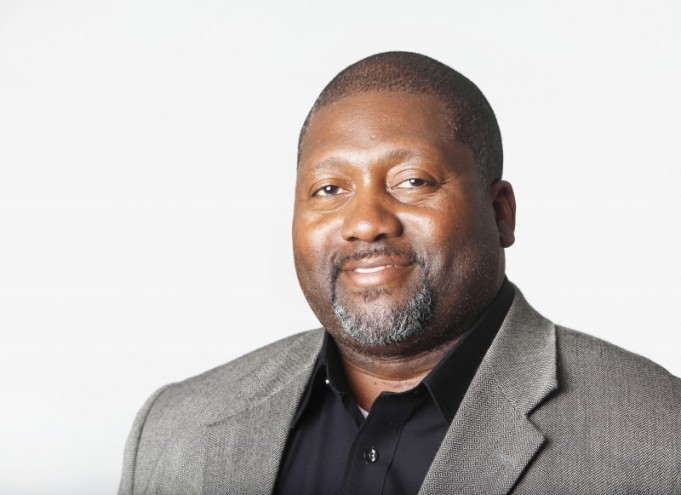If you’ve listened to WIBA-AM radio lately, you’ve probably heard a new voice.
In fact, you’ve heard an entirely new kind of voice.
When Derrell Connor took over Madison in the Morning from 9 – 11 am on the highly-rated news and talk station on September 8, he became the first (as far as anybody can remember) African American to host a major daily talk show in the Madison market.
“So far, so good. We get a lot of phone calls. People are happy,” Connor says. “There have been a lot of well-wishers.”
In the first few weeks, topics have ranged from high school football to the Republican presidential debate to mergers between beer manufacturers.
“Part of Madison in the Morning is talking about the news of the day and the headlines,” Connor says. “We’ll talk some politics, but you won’t hear the consistent political talk that you hear on the station throughout the day. I kind of envision MitM as a mix of what’s happening, we’ll pick out some funny and different kinds of stories and get people thinking. Talking about politics all day every day gets old. Even when you’re preaching to the choir, it gets old.”
And what about race?
“I’m going to tackle these (race) issues, because it affects all of us,” he says. “We’re not going to shy away from talking about these issues. It’s not something we’ll talk about for two hours every day of the week, but it’ll be a part of what we do. At some point you’re like, ‘I get it. Can we talk about something else?’”
Something else is how Connor got his start in radio ten years ago — something else, namely, sports.
In the mid-2000s, cable sports giant ESPN held a nationwide contest called “Dream Job,” in which the prize was the chance to host a sports talk show. The local ESPN Radio affiliate at the time, 1070 WTDY, held a local version called Dream Job Madison. Connor finished in a tie for first place with Eric Johnson. The station decided to break the tie by the only logical means — sports trivia.
Connor lost.
But he had impressed the right people — Mike Lucas, best known as Matt LePay’s broadcast partner on Wisconsin Badger men’s football and basketball broadcasts — told station managers in no uncertain terms that they needed to find a way to put Connor on the air.
And, as it turns out, Johnson didn’t want to host a show solo anyway. So for a year beginning in September 2005, Connor and Johnson co-hosted a Monday night show called Fan Line, where “we just talked about sports.”
At about the same time, Connor was serving as chairman of the board of directors at the Urban League of Greater Madison, and had overseen the search for the group’s new CEO, Scott Gray. ULGM held a reception to introduce Gray to the public that September — and no mainstream media outlets showed up.
The Wisconsin State Journal did run a story on Gray’s hiring, but not until mid-October.
“I remember being very angry,” Connor says. “Any time something goes down in a ‘troubled neighborhood,’ the media are the first ones there. They rush to the scene. But when something positive happens involving people of color, they don’t show up. It’s troubling. It’s frustrating. It has to stop.”
He took his concerns to Tim Scott, program director at ClearChannel Radio (now IHeartMedia) and by June of 2006, he was host of Outreach Radio, a new weekly hourlong show on WIBA — and soon it expanded to two hours.
“The purpose was to raise awareness of folks, folks of color in particular, in the community who are working hard and who people might not know about,” Connor says. Rather quickly, Connor’s circle of influence grew as he started a similar show on WTMJ in Milwaukee and a column for Channel3000.com.
Madison in the Morning will take on some of the same issues, he says.
“This community has some real racial growing pains right now. It’s going to take a concerted effort from all voices all over the community,” he says. “In this town we’ve had a tendency, when these issues come up, it’s only a certain group of people who dominate the conversation, who are allowed to talk about it. It can’t just be one group anymore that gets to talk and dictate what happens. I hope I can play a role in that.”
And what one certain group might that be?
“There isn’t anyone of color on air or in print,” he says, bluntly. “You can bring a guest in, or have a guest columnist come in. But it’s mostly liberal, progressive white people in this community. It’s dominated by people who aren’t of color. So when the issues come up, they get to talk about it. There’s not anything particularly wrong with that. I’m not saying they’re not allowed to talk about it. But if our station is supposed to be a reflection of the community, we need to have different perspectives on.”
Connor will, however, take on any and all issues from his perspective.
“I have to be able to talk about a variety of different issues,” he says. “If it’s just about racial issues, my stint won’t last long.”
He also isn’t going to worry too terribly much about being agreeable.
“There are things I say that people will disagree with,” he says. “That’s fine. That’s talk radio. What makes good radio is you don’t have to agree with people all the time. I’m gonna say things that are gonna bother people sometimes.”
Note: Derrell Connor serves on the board of directors of Madison365.




























